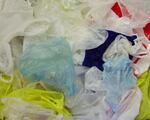
Seattle's ban on single-use plastic bags makes it the latest - and largest - Northwest city to impose such restrictions.
Trosmisiek/Wikimedia Commons
The Seattle City Council's unanimous vote this week to ban plastic shopping bags puts it in company with Portland, Bellingham, Wash., and other cities that have made the move.
Portland's ban, adopted last summer, took effect in October. The Seattle City Council actually led the way among U.S. cities in limiting plastic bags, voting in 2008 to impose a 20 cent charge for each paper or plastic bag used to cart off groceries. But a signature drive led to a successful 2009 ballot measure overturning the ban.
This time around, the Seattle City Council's Monday vote was for a more moderate version. It bans single-use plastic bags at checkout lines and includes a fee of 5 cents for each paper bag used.
Northwest cities continue taking up up such ordinances -- one is under consideration in Eugene -- after state legislatures rejected similar proposals in recent years.
According to the conservation group Surfrider Foundation, the Seattle bag ordinance has the same requirements as the Bellingham ordinance passed in July. The Washington cities of Edmonds and Mukilteo have banned plastic bags and did not include a 4 cent carry-through fee.
Surfrider was part of a coalition of environmental groups that backed the ordinance as a way to keep plastic out of the marine environment, where it breaks down into tiny fragments and enters the food chain for aquatic life.
“Marine debris, largely plastic, is a growing problem,” said Shannon Serrano-Gerritzen of Surfrider Foundation “Reducing our single-use plastic bag consumption through these local bans makes a huge difference -- one we will notice in our many beach clean-ups throughout the year.”
The Northwest Grocery Association, which opposed Seattle's 2008 ban, supported the 2011 version. Plastic bag manufacturers and plastic industry's main trade group, the American Chemistry Association, opposed both proposals.
Mark Daniels, an executive with plastic bag maker Hilex Poly, issued a statement following the city council's vote, saying Seattle was missing an opportunity to lead the way to more meaningful litter reduction through recycling of plastic bags.
"Increased plastics recycling provides a more effective solution for consumers and the environment. It also supports an American industry that provides tens of thousands of jobs," he said.
The Seattle ban is set to take effect in July.
